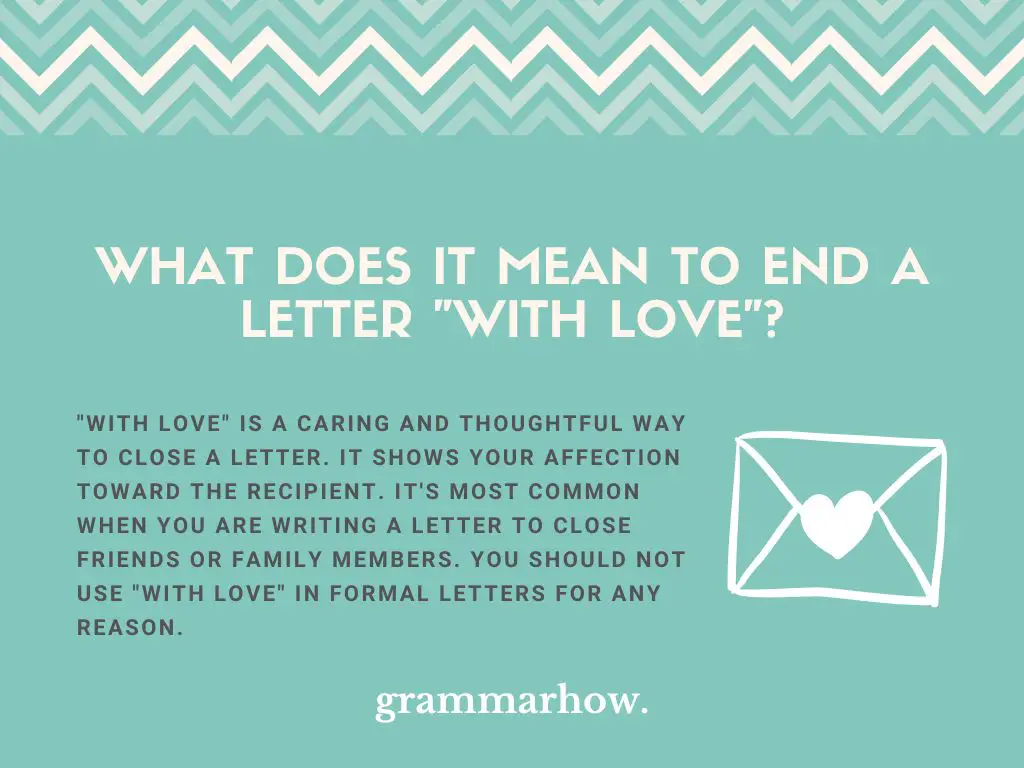“With love” is a cute way to end a letter when you want to wish someone well. Of course, it’s not the most appropriate ending in all situations. This article will explain when you can and can’t use it to help you better understand it.
What Does It Mean to End a Letter “With Love”?
“With love” is a caring and thoughtful way to close a letter. It shows your affection toward the recipient. It’s most common when you are writing a letter to close friends or family members. You should not use “with love” in formal letters for any reason.

“With love” uses “love,” meaning it relates to your affection for a person. You will often find “with love” used in birthday or greeting cards when you’re sending them to loved ones.
It’s important to remember that “with love” is reserved for the ones you love. Don’t use this to close a letter to someone you’ve never met before or a boss you work with. It’s not going to look very professional.
How to Use “With Love” in a Letter
It would help to see how to use “with love” in a letter format. It only comes up at the end, but we’ll include some letter examples to help you understand when it works.
- Dear mum,
- I hope things are going well for you. I hear they’re starting to get better now that dad has left.
- With love,
- Sue
- Dear Mary,
- I miss you so much. I’m sure it won’t be long before we embrace each other again.
- With love,
- Mark
- Dear Peter,
- I think it’s time that I tell you how I truly feel. I’ve left it for too long now.
- With love,
- Sarah
- Dear dad,
- I’m so sorry I didn’t get a chance to tell you this sooner. It would have been much easier then.
- With love,
- Roger
- Dear Alicia,
- I hope there’s something I can do to fix this problem. I hate seeing you like this.
- With love,
- Harry
“With love” is used to share your affection with the recipient. You should only use it when talking to someone you “love” or care for in some form.
It’s best to keep this as a closer in informal emails. It’s informal but personal, making it a great choice to make the recipient feel better.
When Is It Appropriate to End a Letter “With Love”?
It is only appropriate to end a letter “with love” if you are speaking to a loved one or close friend. In any other situation, you should not use “with love.”
Do not use the phrase if you are writing a formal letter to a client, colleague, or someone you’ve never met before. “With love” is informal and personal. You need a formal and impersonal closer like “regards” if you’re trying to be professional in a letter.
Here are some situations when “with love” is not appropriate:
- Dear Mr. Smith,
- I am very much looking forward to our meeting at the weekend. I hope you’ll be happy to learn from me.
- With love,
- Jack
Instead of “with love,” you should try something like “kind regards.”
- Dear Ms. Taylor,
- I have learned a lot from your leadership. I appreciate you giving me a raise.
- With love,
- Marcus
Maybe you should try something more impersonal but formal, like “yours sincerely” here.
- To whom it may concern,
- I look forward to coming into the office to learn more about this.
- With love,
- Chris
Since you don’t know the recipient here, “with love” is definitely not going to work. Try something like “yours truthfully” or “all the best” instead.
With Love vs. With Affection
“With love” and “with affection” are very similar phrases.
“With affection” is slightly more formal, but it’s also very uncommon. Most native speakers will use “with love” when they want to show someone they care because it seems more personal. “With affection” sounds like you’re not treating the recipient like a person.
The only positive for “with affection” is that it’s more formal. However, since it’s uncommon to use “with love” in formal letters, “with affection” doesn’t make sense either.
Alternatives to Ending a Letter “With Love”
The best alternatives to ending a letter “with love” are:
- All the best
- Sending my love
- My best
- Best wishes
- Yours

Martin holds a Master’s degree in Finance and International Business. He has six years of experience in professional communication with clients, executives, and colleagues. Furthermore, he has teaching experience from Aarhus University. Martin has been featured as an expert in communication and teaching on Forbes and Shopify. Read more about Martin here.
